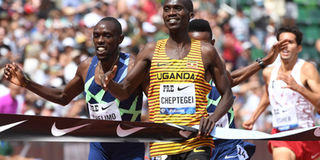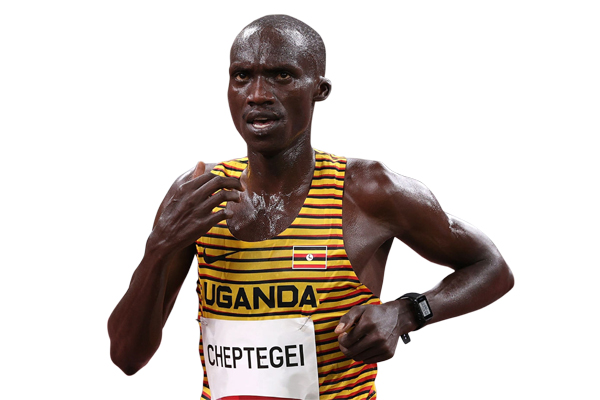UOC develop strategic plan to build towards next two Olympics

Cheptegei won one of Uganda’s gold medals in Tokyo. PHOTO | AFP
What you need to know:
- The energy has instead been channeled to finding ways, in the new strategic plan for the period 2022 to 2027, of sustaining and building on that performance - across all the 33 Olympic disciplines in the country.
Uganda Olympic Committee (UOC) have no hiding place and must ultimately work towards improved performances at the 2024 and 2028 Olympics in Paris and Los Angeles respectively. The last Olympics edition in Tokyo gave Uganda its best ever performance in its history at the Games and there can be no looking back from here.
Two gold medals - one apiece for Joshua Cheptegei and Peruth Chemutai - silver for the former and bronze for Jacob Kiplimo did not only stand Uganda athletics in good light but UOC and the country at large. That success meant that UOC did not even have to over dwell on analysing its previous strategic plan that ran from the period of 2017 to 2021.
The energy has instead been channeled to finding ways, in the new strategic plan for the period 2022 to 2027, of sustaining and building on that performance - across all the 33 Olympic disciplines in the country.
According to one of the group leaders in the process Florence Nakakawa, who is also the treasurer of Uganda Swimming Federation, UOC “put up a panel of team leaders who in turn worked with groups of stakeholders from other sports for two days to assess the last plan and then brainstorm ideas to move sports to another level.
“It was an experience we can also take back to our federations,” she said.
New ideas
The process was overseen by Zimbabwean facilitator Robert Mutsauki, who has collaborated with UOC president Donald Rukare on various global assignments from the International Olympic Committee (IOC) over the years.
“What we have been doing over the last three days is developing elements of the strategic plan; the mission, vision, key areas and roles among others,” Mutsauki said at Sheraton Hotel over the weekend.“The information (on what the plan should entail) is mainly coming from UOC stakeholders because they need to own the process,” Mutsauki, who is now a consultant but has served before as head of athletics and general secretary of Zimbabwe’s Olympic Committee, said.
Mutsauki was also heavily involved in making the first UOC plan (2017-2021) and feels the new chapter should develop aspects of eco-friendly practices, use of technology in management and business development too.
“This includes issues like sponsorship, brand positioning and partnerships.
Also how can we take advantage of winning four medals from Tokyo? Can that translate into additional sponsorship for sport in Uganda since everyone enjoys associating with success?” he pondered.
Bottom-up approach
Rukare believes that for the umbrella body to be successful, the federations must have their own strategic plans “which must be aligned to UOC’s and that of National Council of Sports.”
“The (Olympic) medals athletics got did not come by accident. They had a plan in place and that is what we want from all federations.
We may not implement everything 100 percent and we might make mistakes but our commitment to take sports a step ahead is unwavering,” Rukare said.
Unfortunately, of the 33 federations, only a handful; basketball, athletics, volleyball and swimming, have strategic plans. So like they have done for sports management and administration over the years, UOC will now channel some energy into “training federations on how to develop and implement their plans because not having a plan is like having a ship without a compass.”




